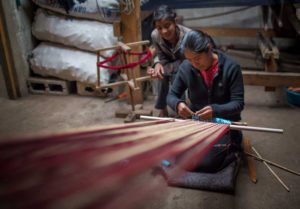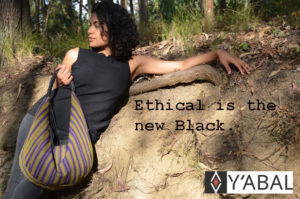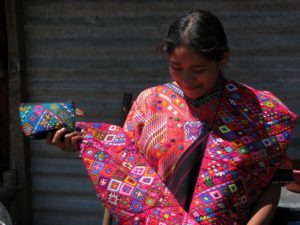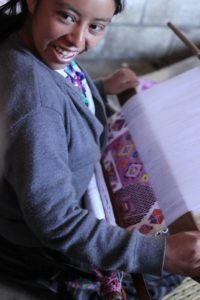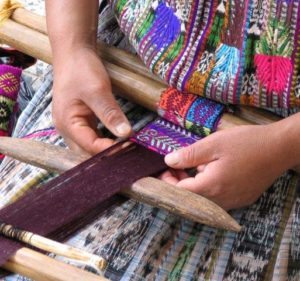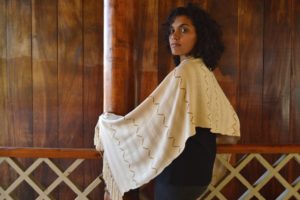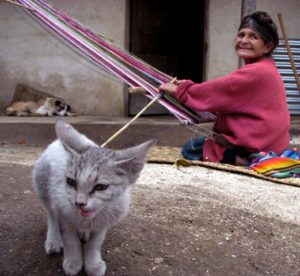A conversation with Yabal founder, Allison Havens.
Origin
Yabal is a k’iche’ word which means “hope”. We began in 2005 to support two indigenous communities that were destroyed and subsequently displaced in the aftermath of Hurricane Stan that affected many areas of Guatemala during that time. Yabal began as an organization to help these communities rebuild their homes and provide disaster and first aid relief after the storm. From there, our relationship with the communities grew and it became clear that they struggled to provide enough food and necessities for their families as there were very few jobs available and the families did not have enough land to farm their own food. At the urging of the women in the community, we started working with them to form a cooperative and textile business with the mission to provide the women in the communities a sustainable source of income.
We employ around 60 women artisans. Most of our artisans are also mothers and face extra challenges such as lack of education, illiteracy, rurally isolated, and many don’t speak much Spanish, k’iche’ is their first language. All of these things make it nearly impossible to find sustainable work opportunities that would allow them to adequately provide for their children.
The Organization
We make accessories for women, men, and the home including bags, wallets, ties, scarves, computer cases, yoga mat carriers, and more. Our designs are a collaboration of more modern color combinations mixed with the traditional weaving techniques from our women artisans. It’s always a collaborative organic process between all of us.
All profits and donations are used to fund social programs in our artisan communities. Apart from the weaving project, we fund educational scholarships, entrepreneurship workshops, maternity leave pay, sewing classes, micro-credits, and food security projects such as vegetable gardens and an oyster mushroom cultivation program. We meet regularly with our board of directors who is made up of women leaders from our two partner communities and through these meetings and conversations we are able to identify needs in the communities, the impact of our social programs, and propose new projects together.
We have a physical store and workshop in Quetzaltenango, Guatemala where we sell our products to both tourists and local Guatemalans. However, the other half of our business is selling wholesale to boutique stores in the US and Europe, as well as, producing custom artisanal designs for international designers looking for ethical production practices.
We have a very limited marketing budget so we use a lot of free marketing options such as social media, newsletters, our website and blog, email outreach, as well as word of mouth recommendations. Generally people first love our products because they’re beautiful and well-made and then extra love them when they find out about the social mission and artisanal techniques behind everything.
Impact
Some of our social impact can be measured in solid numbers such as in the amount of income the women in our weaving project earn compared to before they joined the cooperative, the increase in the family’s economic situation, increase in the number of children that attend school. But other types of social impact can only be measured through conversations and relationship building with our cooperatives, in order to perceive changes such as increase in self confidence, greater equality between men and women in the communities, greater hope for their childrens’ future- all of which we’ve also seen greatly improve since Yabal has been working in these communities.
We decided to focus on sustainable fashion out of our dedication to creating poverty solutions for rural women in Guatemala. We did not start out as designers nor as fashion industry experts but rather saw a need for sustainable jobs for women in Guatemala based on skills that they already possessed. And it just so happens that Mayan women practice a centuries-old textile weaving tradition that is incredibly intricate and beautiful. So we decided to use that skill as the base in creating sustainable jobs and that path led us into the world of sustainable fashion and design.
We have changed the lives of over 50 women and their families through Yabal. We have seen their children go to school, increased self confidence of the women, and increase equality between men and women in the communities, and over all better economic situation of our artisans. One of our biggest challenges is having to say no to new women that ask to join our project. We have a strong commitment to the women in our cooperatives to give them bi-monthly well paid jobs that they can count on. Because of this, we aren’t able to incorporate new women until we are sure that our sales can support new artisans. It is always hard to say no to a women who is in need of this work, which is why we are working even harder to grow our business so that we can bring more women into the project.
Looking ahead
We are in the midst of designing an exciting new home accessories collection this year with all ecological and recycled materials. It’s a bit different direction that we’re taking this year but we’re excited by creating a 100% sustainable product in all aspects of the word- both socially and environmentally. We’re currently working with our artisans now on prototypes for weaving with plastic bags as well as woven textiles using plant-dyed threads, recycled denim jean threads, and organic wool yarn. We’re hoping to launch in late summer of 2018.
For more information about Y’abal, visit: https://www.yabalhandicrafts.com


